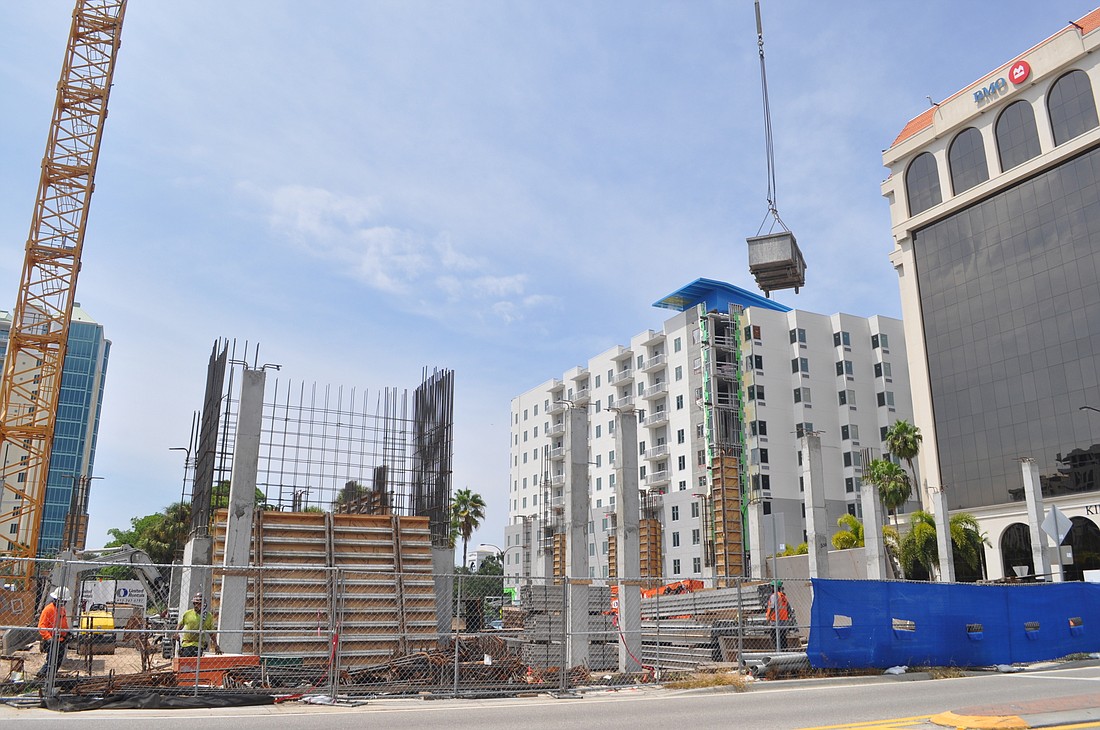- April 18, 2024
-
-
Loading

Loading

Four years ago, the city of Sarasota agreed to suspend a fee on new development. Officials saw a steep decline in building and sought to create an incentive that would counteract the sluggish economy.
Now, with cranes popping up throughout the city, commissioners are reconsidering their decision to let go of those water and sewer impact fees. Although a consultant report said suspending those impact fees would have a minor financial impact, staff calculated that assessing fees in 2015 would have generated approximately $1 million in revenue.
As a result, the commission will soon vote on reinstating the city’s water and sewer impact fees. Based on the size of the development (and the associated water meter), those costs could vary. The smallest water meter comes with a $3,477 fee, and the largest would cost a builder $278,168. Large projects like Vue Sarasota Bay, which includes 141 condo units and 255 hotel rooms, would generate hundreds of thousands of dollars in new fees.
The city can’t raise its water and sewer impact fees and use the funds however staff would like. Money would go specifically toward improving water and sewer infrastructure to support new developments.
“We have a lot of projects and developments going, but our impact fees haven’t kept up to pace,” Commissioner Susan Chapman said.
Chapman doesn’t want the conversation to stop with water and sewer fees, which the commission unanimously agreed to revisit at a future meeting. She wants to reconsider the multimodal transportation fee, set between 42% and 50% lower than the calculated costs added by new developments. She also suggested a workforce housing impact fee could generate money for affordable residential projects.
The city isn’t the first government to re-examine its impact fees post-recession. Although builders fought against the Sarasota County School Board’s reinstated impact fees last year, the decision is expected to some degree. Mary Dougherty-Slapp, executive director of the Gulf Coast Builders Exchange, said the group was monitoring the city’s discussions as they progressed.
“With any conversation, there are a few things to be concerned about,” Dougherty-Slapp said. “One, about the nexus. Two, about fairness, and three, making sure you don’t go so far asunder that you hinder economic development.”
She cited Collier County as an example of a government that went too far in assessing new impact fees, discouraging economic investment and preventing the creation of workforce housing. Even with new building on the rise, she believes there’s room for continued growth in Sarasota.
“We still need economic growth and prosperity in this community,” Dougherty-Slapp said. “We need to take a complete look at the community, and look at that in a way where there is a balance.”
Jon Mast, CEO of the Manatee-Sarasota Building Industry Association, took a harder line against the concept of impact fees. In addition to the potential return of water and sewer fees, builders are charged to help pay for transportation, education, park, library, justice, emergency medical and general government services.
Although the BIA has campaigned against what it views as an unfair tax, most municipalities are disinclined to remove them.
“We haven’t gotten very much traction getting those impact fees eliminated,” Mast said. “Until we do, my constituency will probably not be satisfied.”
Chapman, with the backing of some Sarasota residents, has raised concerns about the general rate of growth in the city. Doughtery-Slapp cautioned against any instinct to raise fees to ward off new developments, encouraging city officials to strike an appropriate balance with builders.
“An impact fee is supposed to be a fair amount to build appropriate infrastructure for new development,” Dougherty-Slapp said. “If you’re trying to cap new growth, that’s not what impact fees are.”